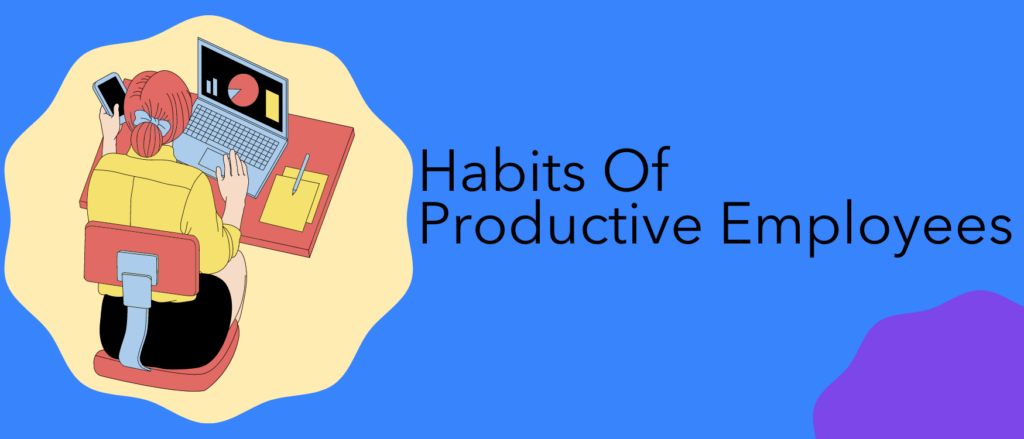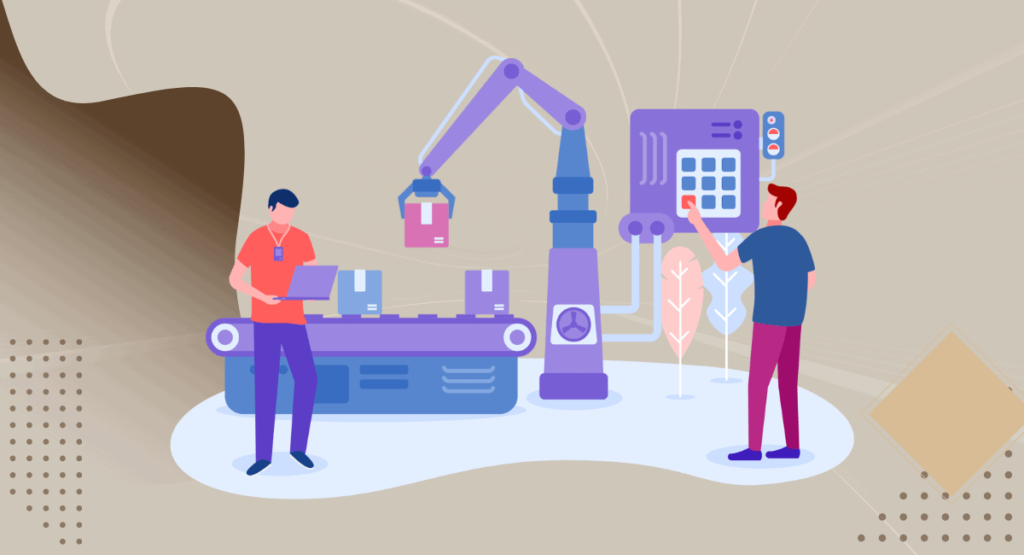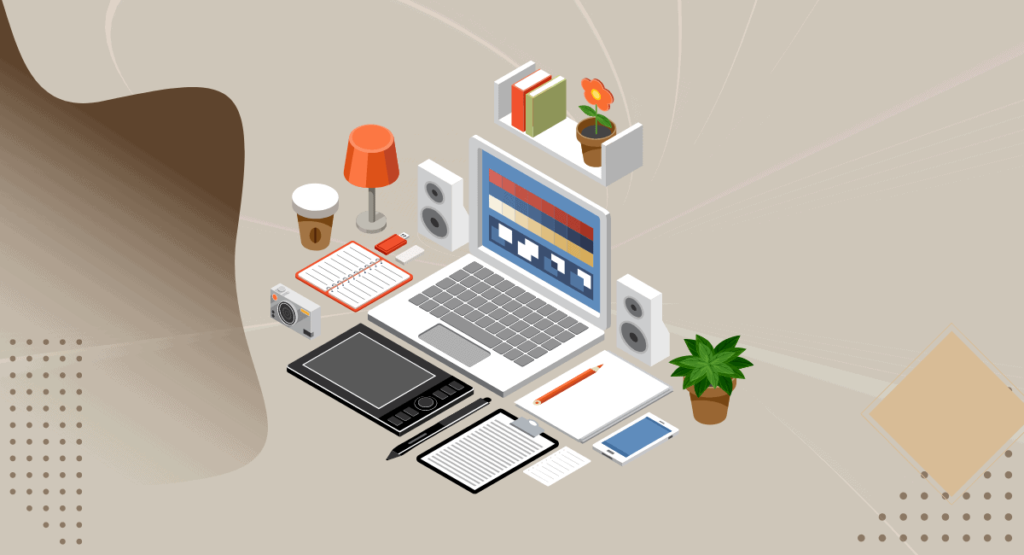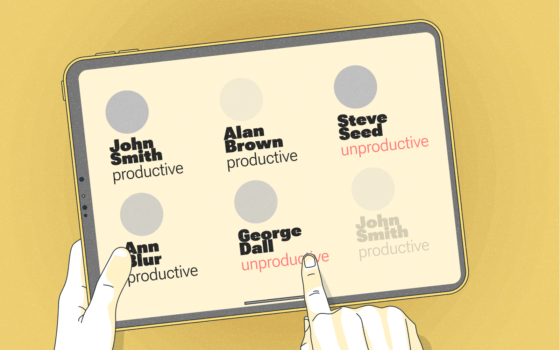Habits of Productive Employees


The great thing that comes to mind about a good work day is being in the flow. Being productive, focused, and making progress.
How do productive people work? What are their secrets? How can you structure your habits to work more effectively and achieve more in less time?
We will talk about ten tips to work as a productive person, the importance of having a routine, and how to set up reminders to keep you on track.
Follow these tips, and you will be able to achieve more than ever before!
What is a productive work day?
“People often let go of healthy habits when working from home.” Deloitte.
A productive work day is one in which you get things done effectively and with focus. You aren’t wasting time by being distracted, you’re getting things done, and your schedule is complete until the end of the day.
Whether this is through checking things off your to-do list, getting your work done, or finishing other essential tasks, the point is that the bulk of your day is not spent inefficiently.
This is key because being productive allows you to get work done and accomplish other essential tasks you didn’t have time for when you were distracted. Plus, if you’re getting things done, you also have a chance to feel like you didn’t waste your day.
How do you achieve that? Follow these habits:
#1 Establish a routine
A great routine is one of the best ways to increase your productivity. By setting aside a few extra hours each day for specific tasks, you can ensure that you’re always making progress on your to-do list.
Additionally, a routine can help you focus your attention and avoid distractions. If you know what you need to do and when you need to do it, it’s easier to stay on track.
Finally, a routine can make it easier to stick to a schedule, and having a set time for each task makes you less likely to procrastinate or get sidetracked. So, the way to boost your productivity by establishing a routine is a great start.
#2 Set up reminders and block times
The secret of successful people is that they spend their time carefully. They know that their time is limited, so they use it wisely.
The way to do this is to set up reminders and block off time in your schedule for specific tasks. This helps you to use your time more efficiently and avoid getting sidetracked.
Many productivity apps can help you with this, such as Trello. Monday, Clickup and Evernote or Monitask. Planning your day and setting up reminders can ensure you get the most out of your day.
#3 Write down your goals
Truly productive people do not just work hard; they work smart. A crucial part of working smart is setting and achieving goals. When you have a specific purpose, you are more likely to stay focused and work efficiently towards that goal.
Additionally, writing down your goals increases the likelihood of achieving them.
So if you want to be truly productive, start by setting some goals and writing them down. You may be surprised at how much you can accomplish.
#4 Prioritize tasks

It is said that success is not what you achieve but what you prioritize. Many people strive for personal satisfaction, job satisfaction, or a mix of both.
While some might argue that personal satisfaction should be the number one priority, it is essential to remember that our jobs often provide us with the means to live out our personal goals.
Therefore, it is essential to find a balance between the two. One way to do this is to list your priorities and then rank them in order of importance.
This will help you see where to focus your energy to achieve your goals. By taking the time to prioritize your tasks, you can ensure that you are making the most out of your time and efforts.
#5 Take breaks
Most of us have a work habit that we think is efficient:
- Work until we’re tired.
- Take a break when needed.
- Keep going until the work is done.
However, research suggests that this isn’t necessarily the most effective way to work. Some of the most productive workers are those who take regular breaks.
Taking breaks gives our brains a chance to rest and rejuvenate, and we can come back to our work with fresh energy and new ideas. In addition, taking breaks can help reduce stress and improve our overall well-being.
Taking a break may seem counterintuitive – after all, aren’t the most efficient workers the ones who power through without stopping? However, breaks are essential for maintaining focus and productivity.
When you take a break, your mind gets a chance to rest and recharge, enabling you to tackle challenging tasks when you return to work. In addition, breaks can also help to boost your creativity.
Being away from your work for a few minutes can give you a new perspective and help you see problems in a new light. So next time you feel stuck, don’t be afraid to take a break – it might be the key to getting your best work done.
#6 Stay organized
Organization is key to peak productivity levels. When your work area is tidy, and everything is in its place, you can work mentally refreshed without distractions.
Organize a system that works and stick to it. This may mean designating specific areas for certain tasks, setting up folders or binders, or using a bulletin board to stay ahead of deadlines.
Whatever system you choose, it is essential to be consistent with it. Training your brain to expect a certain organization level will help you be more productive overall.
#7 Use technology to your advantage
In today’s job market, using technology to your advantage is more critical than ever. With successful careers increasingly reliant on owning and understanding complex technological skills, those who fall behind are at risk of being left out.
However, it is not enough to be familiar with the latest technology; you also need to be able to put it to use. To stand out from the competition, you must demonstrate how to use technology to solve personal problems and improve your work.
By taking the time to learn about and master the latest technology, you can give yourself a valuable advantage in the career world.
#8 Be disciplined
Good work habits are the key to success in any field. Superhuman performers in any field have typically developed good work habits early in their careers. These work habits become so ingrained that they eventually become their second nature. The most successful people in any field have developed the best work habits.
One of the most crucial work habits is discipline. Discipline is the ability to stick to a task even when you don’t feel like it. It’s about staying focused and motivated even when the going gets tough. Disciplined people are usually the ones who achieve the most in their careers.
To succeed, you need to develop good work habits, and discipline is one of the most important ones you can create. It’s not easy, but it’s worth it.
#9 De-stress and relax
When you’re feeling overwhelmed or stressed, it’s essential to communicate effectively with those around you. It is important to de-stress and relax.
Whether you’re speaking with a friend, family member, or therapist about what’s causing you stress can help reduce its impact. In addition, taking some time for yourself can also help to refresh and rejuvenate your mind.
You are going for a walk can give you renewed energy.
#10 Celebrate your accomplishment
Job done! Whether you just completed a project at work or wrapped up a big presentation, it’s essential to take the celebration of your accomplishments. A pat on the back not only feels good but can also help increase your confidence as a worker.
Recognizing your successes helps you see yourself as competent, encouraging you to step up and take on new challenges.
So, next time you finish something big, take a few minutes to reflect on what you’ve achieved -you deserve it!
The benefits of having a structured work day

Increased productivity
Being productive allows you to finish more in less time. The more you’re focused, the less time you have to waste on unimportant tasks and tasks that don’t add value to your work.
Increased focus
Constantly being focused means you aren’t as likely to be distracted by every little thing happening in your life. Additionally, getting many things done makes you less likely to feel overwhelmed and stressed about your responsibilities.
Less stress
You don’t have to always be in a rush, and if you try to complete your critical jobs in a single day, you’re bound to become stressed out. Planning your schedule and knowing that you have time to complete tasks gives you a chance to relax and not feel like you have to rush through everything.
Better sleep
Properly structure your day and get a good amount of rest every night.
Set up your workspace properly

One of the essential things about structuring your work day is how you set up your workspace. It is hard to be productive if you have a messy desk and a distracting work environment.
A messy desk isn’t going to help you get anything done. What’s most important is what you have on your desk and around your workspace, not the desk itself. Start by keeping your desk clean and organized. Not only will it be easier for you to focus when you have a clean desk, but it will also save you time.
When you start piling up papers and notes on your desk, you’ll begin to take longer than necessary to complete tasks. Tips: there should be one spot on your desk where you keep all your essential items.
This could be a mug with your pens, a special place where you keep your lunch bag, or whatever else you think is important enough to be right in front of you.
Eat breakfast like a king.
Breakfast is often the most important meal of the day. You’re setting yourself up for a bad day when you don’t eat properly.
To have a productive work day, you must be focused and alert. When you start your day without eating something, you’re setting yourself up for a crappy day and potentially missing out on a good meal for free.
That said, you don’t want to eat something that will make you so stuffed that you can’t focus on your work. Instead, go for something that has low calories and is full of vitamins, minerals, and other essential nutrients for you to be productive.
Don’t check email first thing in the morning.
Most people check their email in the morning when trying to get things done. It may look like a good idea, but here are a few reasons why checking email in the morning isn’t the best.
You’re not in the right mindset.
It is not good to check your email first thing in the morning. You’re not getting yourself in the right mindset. You’re not going to be in a good mood if you’re already stressed out about the day.
You’re going to recheck your email.
Countless people check email first thing in the morning but then recheck it before leaving for work. This isn’t only a waste of time but will also take you out of your groove when you first check your email.
You’ll rush through tasks.
The same thing when you check email before leaving for work will happen when you rush through tasks to check them off your to-do list.
Exercise regularly

There’s plenty of anecdotal evidence that exercise is good for you, but we don’t fully understand why. One theory is that exercise is essential for building and maintaining the neuroendocrine and immune systems (all systems that help fight disease and infection). Regular exercise helps us keep our bodies healthy and active, meaning we’re less likely to develop health issues. The average person should be doing 30 minutes of exercise at least five days a week to reap the health benefits.
Plan your day in advance
Planning your day doesn’t only help you stay on track, but it can also help you save time when you’re rushing to make it to your destination on time.
If you don’t have a schedule, you’re constantly allowing yourself to get behind. And with the number of interruptions we face in our day, getting off track at one point or another is inevitable.
Planning your day gives you a set amount of time to complete specific tasks, which will help you stay on track. For instance, when you set a meeting scheduled at 10 am, you know you have a set amount of time to get everything that needs to be done for that day.
Build a to-do list for the week and daily stand-ups
Having a to-do list for the week and a daily one for the day is essential. This is especially true for non-managerial employees like administrative assistants, janitors, and other roles that don’t directly affect the business outcomes.
These tasks are not as crucial as more strategic ones, but they still need to be completed. Keeping a to-do list for the week and a daily one for the day allows you to use time efficiently when it comes to the smaller tasks and not forget anything.
Take a break and stand up regularly.
Studies show that standing up for just two minutes every hour can increase your productivity.
Schedule time in the morning to get your most important tasks done. Then you can work the rest of the day focusing on other things, like responding to emails or spending time with your team.
One of the biggest challenges in being efficient with your time is determining if something is essential or not. To help you, check some tips for getting started:
- Figure out your priorities by taking stock of your time and responsibilities.
- Focus on the tasks that are crucial for your job.
- Make sure you spend enough time with your customers or clients to build a better relationship with them.
Conclusion
Time management is concerned with identifying and prioritizing tasks and activities that need to be accomplished within a certain period and organizing these tasks in such a way as to maximize efficiency and productivity.
The most common tool used for time management is the “to-do list.” Other methods include calendars and reminders linked electronically to computers, mobile devices, or paper-based systems like daily planners or notebooks.


